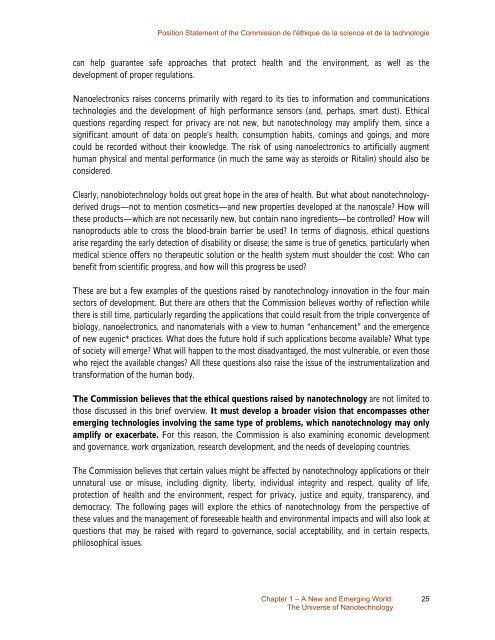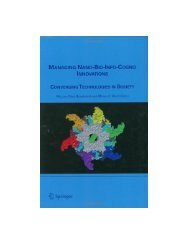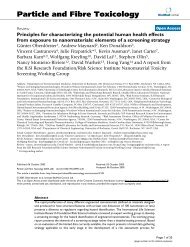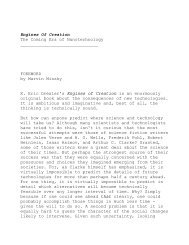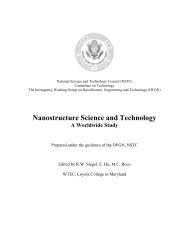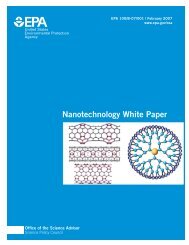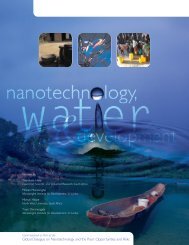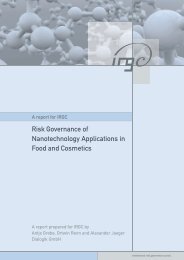A Basis for Action - Commission de l'éthique de la science et de la ...
A Basis for Action - Commission de l'éthique de la science et de la ...
A Basis for Action - Commission de l'éthique de la science et de la ...
You also want an ePaper? Increase the reach of your titles
YUMPU automatically turns print PDFs into web optimized ePapers that Google loves.
Position Statement of the <strong>Commission</strong> <strong>de</strong> l'éthique <strong>de</strong> <strong>la</strong> <strong>science</strong> <strong>et</strong> <strong>de</strong> <strong>la</strong> technologie<br />
can help guarantee safe approaches that protect health and the environment, as well as the<br />
<strong>de</strong>velopment of proper regu<strong>la</strong>tions.<br />
Nanoelectronics raises concerns primarily with regard to its ties to in<strong>for</strong>mation and communications<br />
technologies and the <strong>de</strong>velopment of high per<strong>for</strong>mance sensors (and, perhaps, smart dust). Ethical<br />
questions regarding respect <strong>for</strong> privacy are not new, but nanotechnology may amplify them, since a<br />
significant amount of data on people’s health, consumption habits, comings and goings, and more<br />
could be recor<strong>de</strong>d without their knowledge. The risk of using nanoelectronics to artificially augment<br />
human physical and mental per<strong>for</strong>mance (in much the same way as steroids or Ritalin) should also be<br />
consi<strong>de</strong>red.<br />
Clearly, nanobiotechnology holds out great hope in the area of health. But what about nanotechnology<strong>de</strong>rived<br />
drugs—not to mention cosm<strong>et</strong>ics—and new properties <strong>de</strong>veloped at the nanoscale? How will<br />
these products—which are not necessarily new, but contain nano ingredients—be controlled? How will<br />
nanoproducts able to cross the blood-brain barrier be used? In terms of diagnosis, <strong>et</strong>hical questions<br />
arise regarding the early <strong>de</strong>tection of disability or disease; the same is true of gen<strong>et</strong>ics, particu<strong>la</strong>rly when<br />
medical <strong>science</strong> offers no therapeutic solution or the health system must shoul<strong>de</strong>r the cost: Who can<br />
benefit from scientific progress, and how will this progress be used?<br />
These are but a few examples of the questions raised by nanotechnology innovation in the four main<br />
sectors of <strong>de</strong>velopment. But there are others that the <strong>Commission</strong> believes worthy of reflection while<br />
there is still time, particu<strong>la</strong>rly regarding the applications that could result from the triple convergence of<br />
biology, nanoelectronics, and nanomaterials with a view to human “enhancement” and the emergence<br />
of new eugenic* practices. What does the future hold if such applications become avai<strong>la</strong>ble? What type<br />
of soci<strong>et</strong>y will emerge? What will happen to the most disadvantaged, the most vulnerable, or even those<br />
who reject the avai<strong>la</strong>ble changes? All these questions also raise the issue of the instrumentalization and<br />
trans<strong>for</strong>mation of the human body.<br />
The <strong>Commission</strong> believes that the <strong>et</strong>hical questions raised by nanotechnology are not limited to<br />
those discussed in this brief overview. It must <strong>de</strong>velop a broa<strong>de</strong>r vision that encompasses other<br />
emerging technologies involving the same type of problems, which nanotechnology may only<br />
amplify or exacerbate. For this reason, the <strong>Commission</strong> is also examining economic <strong>de</strong>velopment<br />
and governance, work organization, research <strong>de</strong>velopment, and the needs of <strong>de</strong>veloping countries.<br />
The <strong>Commission</strong> believes that certain values might be affected by nanotechnology applications or their<br />
unnatural use or misuse, including dignity, liberty, individual integrity and respect, quality of life,<br />
protection of health and the environment, respect <strong>for</strong> privacy, justice and equity, transparency, and<br />
<strong>de</strong>mocracy. The following pages will explore the <strong>et</strong>hics of nanotechnology from the perspective of<br />
these values and the management of <strong>for</strong>eseeable health and environmental impacts and will also look at<br />
questions that may be raised with regard to governance, social acceptability, and in certain respects,<br />
philosophical issues.<br />
Chapter 1 – A New and Emerging World: 25<br />
The Universe of Nanotechnology


